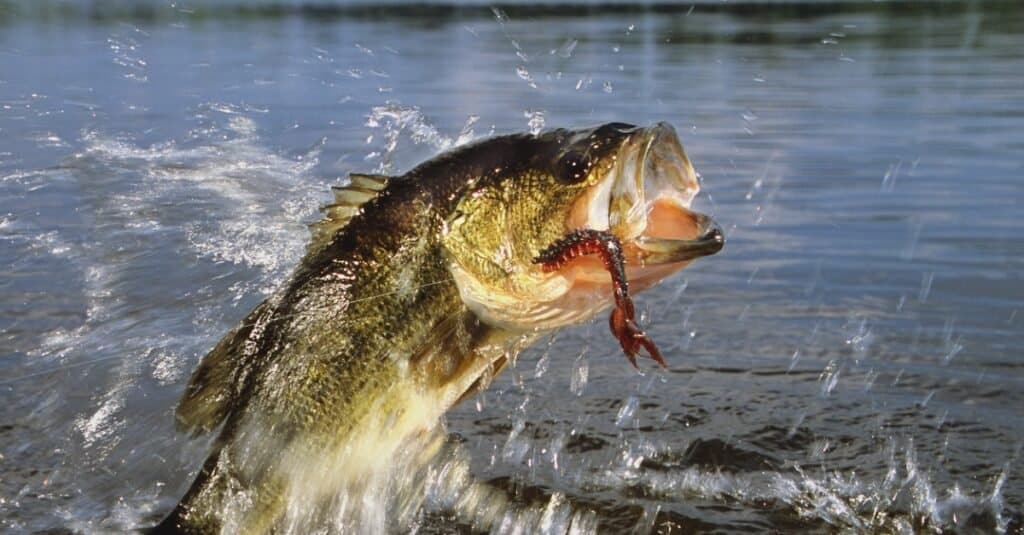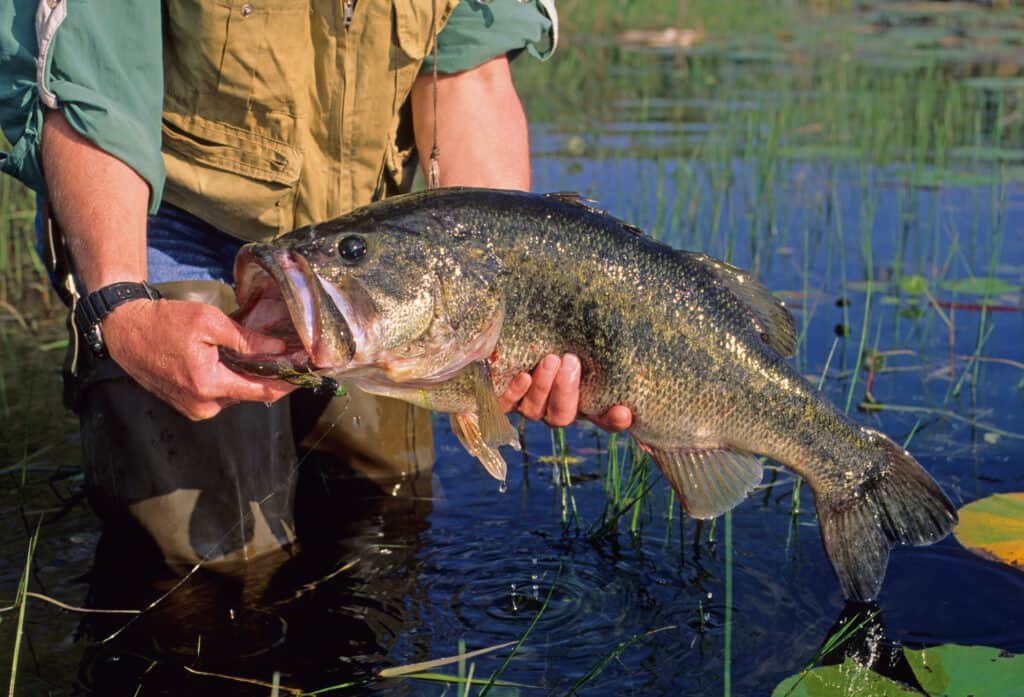The largemouth bass reigns supreme in recreational fishing thanks to its global distribution, accessibility to anglers of all socio-economic levels, and famous game fish traits. No other species has such a huge and passionate international following as the largemouth bass.
Mississippi, a popular freshwater and saltwater fishing destination, is one of the best places in the United States to catch large largemouth bass. How big is the largest largemouth bass ever caught in the Magnolia State? This article uncovers the largest largemouth bass caught in Mississippi and other fascinating facts.
What Is the Largest Largemouth Bass Caught in Mississippi?

The largest largemouth bass caught in Mississippi weighed 18 pounds and 15 ounces.
©iStock.com/stammphoto
The largest bass in Mississippi weighed 18 pounds and 15 ounces, and was caught at Natchez State Park, a 3,440-acre sanctuary approximately 10 miles north of its historic namesake city. The state record belongs to Anthony Denny, who captured the monster fish using a Rattling Rogue jerk bait on December 31, 1992.
On New Year’s Eve in 1992, Anthony Denny broke the record in the Magnolia State with the 18-pound, 15-ounce monster caught in Natchez State Park Lake. His capture undoubtedly provided more than enough justification for a huge New Year’s celebration. Interestingly, Denny hooked his state-record fish in just two feet of water in a tiny cove. Additionally, it was claimed that the New Year’s Eve was unusually warm, which might have assisted in luring the largemouth bass into shallow water.
Largest Largemouth Bass Ever Caught in the United States
The 22-pound, 4-ounce largemouth bass caught in Georgia was the heaviest ever weighed in American history, and this record is also the oldest! In 1932, an angler named George Perry captured the fish in Montgomery Lake.
Even though it is fascinating to note that it happened a very long time ago, Lake Castaic in California was the site of the second-largest capture. The lucky fisherman was Michael Arujo, who caught the 21-pound, 12-ounce fish back in 1991.
The third and fourth largest catches in this category came in 1992, with one weighing 18 pounds 2.8 ounces while the other was Denny’s 18 pounds 2.4 ounces bass, respectively. The year 1992 was a fantastic year for breaking records in this category, and Denny’s largemouth bass was ranked the fourth-largest largemouth in the United States.
What Are the Top Bass Fishing Lakes in Mississippi?
1. Pickwick Lake
Pickwick Lake, located within Tishomingo County on the border between Tennessee and Alabama, is well-known for its trophy smallmouth fishing but also supports a sizable population of largemouth bass. Despite intense fishing pressure, Pickwick has consistently produced large bass for decades.
2. Lake Ferguson
There are lots of good largemouth bass on Lake Ferguson, and a true trophy is always feasible. The lake regularly produces largemouth bass in the three-to-five-pound bracket. Catch rates are strong here, which makes this a sought-after location for competition and leisure fishing.
3. Bay Springs Lake
Bay Springs Lake consistently produces spotted bass in the three-to-five-pound bracket. Additionally, Bay Springs Lake yields double-digit largemouth, with the odd fish exceeding 11 pounds. Fishermen who wish to catch largemouth bass and giant spotted bass must include Bay Springs in their annual fishing plans.
Largemouth Bass in Mississippi and Its Habitat

Largemouth bass can be found under lily pads or in the shadow of overhanging trees, piers, or vegetation.
©iStock.com/stammphoto
Largemouths are more frequently seen in rocky banks or streams like Bear Creek. They enjoy warm, moderately clear waters. Woody debris and aquatic vegetation are essential elements of a largemouth’s high-quality habitat, and the shallow nearshore region, known as the littoral zone, provides adequate light for aquatic vegetation to flourish.
Largemouth bass are drawn to structures throughout the day and can be found under lily pads or in the shadow of overhanging trees, piers, or vegetation. They usually move into shallow waters in the evening and feed until after daylight before withdrawing to deeper waters for the rest of the day. They are rarely encountered at depths below the area at which a rooted plant grows. Largemouth bass can endure high temperatures, but they prefer deeper, colder waters in the summer.
Can You Eat Largemouth Bass?
Yes, the largemouth bass is edible. The largemouth bass is a very delicious food; freshwater or saltwater bass may be safely consumed when prepared properly, which is fantastic news if you enjoy fishing. It may be quite low in calories and high in vitamins and protein. Its meat is white, flaky, and has a soft consistency. The flavor of the bass varies greatly throughout the world and even within the United States.
Up Next:
- The 10 Biggest Lakes in Mississippi
- The 5 Weirdest Fish in the Mississippi River The 5 Best Fish to Catch in Mississippi This Summer
- The 5 Best Fish to Catch in Mississippi This Summer
- Discover the Largest Largemouth Bass Ever Caught in Tennessee
The photo featured at the top of this post is © Maclane Parker/Shutterstock.com
Sources
- eRegulations, Available here: https://www.eregulations.com/mississippi/fishing/freshwater/state-record-freshwater-fish
- Sportman's Guide, Available here: https://guide.sportsmansguide.com/adventures/mississippi-state-parks-offer-excellent-fishing/
- World Population Review, Available here: https://worldpopulationreview.com/state-rankings/largemouth-bass-record-by-state
- Mississippi Wildlife, Fisheries, and Parks (1970) https://www.mdwfp.com/media/news/fishing-boating/mississippis-bass-slam/#:~:text=Largemouths usually prowl weed edges,on rocky banks with smallmouths
- Wisconsin Department of Natural Resources, Available here: https://dnr.wisconsin.gov/topic/Fishing/mississippi
Thank you for reading! Have some feedback for us? Contact the AZ Animals editorial team.






